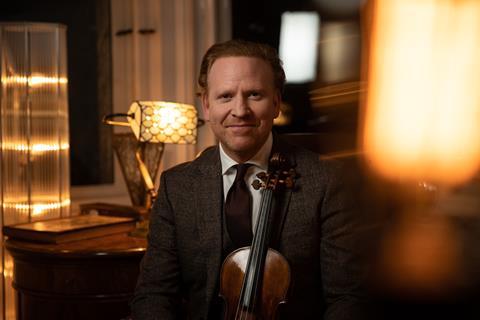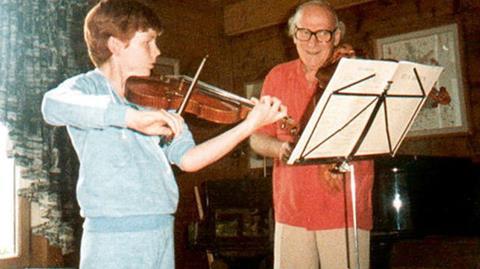The violinist on his many influences and what is at the heart of a musician’s career

Discover more Featured Stories like this in The Strad Playing Hub.
Read more premium content for subscribers here
It was a huge stroke of luck for me to have Sheila Nelson as my first teacher – she was the teacher for young kids. She gave me that initial impulse. And apart from all the technical aspects, it was simply a tremendously fun experience. She also instilled in me the ability to improvise, which grew into a confidence and openness to go with my ears, not my eyes.
Between 9 and 14 I had two teachers: Felix Andrievsky and his assistant at the time, Itzhak Rashkovsky. They complemented each other ideally. Itzhak was very direct and would demonstrate everything by playing. His criticism was always justified yet constructive, and I’m still very much a believer in this today. You shouldn’t just tear someone apart for no reason – rather, you should look at the problem, analyse it and fix it. Felix was more about fantasy and imagination. He urged me to dive deeply into the repertoire I loved and not to be scared of it. I still remember him saying, ‘You must play with a warm heart but a cold head.’
You never know who is sitting in the crowd
My studies with Zakhar Bron were incredibly intense. At one point I had a lesson every day. I thrived under the pressure that came with his teaching style. You never knew whether your lesson would happen in five minutes or three hours, as it depended on whether those before you had prepared well enough not to be sent home. Bron analysed problems in a thoroughly forensic manner, always using technique to produce music without separating the two. I probably learnt most about sound and production and sonority from him. He believed in the concentration of sound, and that to create more sound you use less bow. Conversely, to create less sound you use more bow. I looked forward to every lesson because it was unlike anything else in terms of duration, intensity and the quality of teaching. To experience someone so in love with the craft of violin instruction was deeply inspiring.

The journey to becoming a professional musician has changed dramatically throughout my life, but there are some things that will never change. A career is built on re-engagement. You can play somewhere once, but the organiser will need to be happy enough with you to ask you back. If that is sustained, then your career can last a lifetime.
I’d urge musicians to see each concert as the most important one in their lives. You never know who is sitting in the crowd, even in the smallest town or venue. There could be someone there who could literally change your life – it’s happened to me several times. You need to seize every opportunity you get. Even if we simply can’t be at the top of our game every day, it still needs to be your ideal.
INTERVIEW BY RITA FERNANDES
Read: A musical mosaic of Ireland: violinist Daniel Hope on ‘Irish Roots’
Read: Masterclass: Daniel Hope on the Franck Violin Sonata
Discover more Featured Stories like this in The Strad Playing Hub.
Read more premium content for subscribers here
The number one source for playing and teaching books, guides, CDs, calendars and back issues of the magazine.
In The Best of Technique you’ll discover the top playing tips of the world’s leading string players and teachers. It’s packed full of exercises for students, plus examples from the standard repertoire to show you how to integrate the technique into your playing.
The Strad’s Masterclass series brings together the finest string players with some of the greatest string works ever written. Always one of our most popular sections, Masterclass has been an invaluable aid to aspiring soloists, chamber musicians and string teachers since the 1990s.
The Canada Council of the Arts’ Musical Instrument Bank is 40 years old in 2025. This year’s calendar celebrates some its treasures, including four instruments by Antonio Stradivari and priceless works by Montagnana, Gagliano, Pressenda and David Tecchler.













































1 Readers' comment